|
|
|
Sort Order |
|
|
|
Items / Page
|
|
|
|
|
|
|
| Srl | Item |
| 1 |
ID:
131958
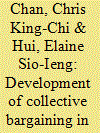

|
|
|
|
|
| Publication |
2014.
|
| Summary/Abstract |
2010 was a turbulent year for labour relations in China. The wave of strikes sparked by the Honda workers has highlighted the urgent need for trade union reform and workplace collective bargaining. In response to this turbulence, the Chinese government has stepped up efforts to promote the practice of collective bargaining, which had been neglected under the existing "individual rights-based" labour regulatory framework. In the midst of rapid social and policy changes, this article aims to examine the effect of labour strikes on the development of collective bargaining in China. The authors argue that, driven by growing labour protests, the collective negotiation process in China is undergoing a transition, from "collective consultation as a formality," through a stage of "collective bargaining by riot," and towards "party state-led collective bargaining." This transition, however, is unlikely to reach the stage of "worker-led collective bargaining" in the near future.
|
|
|
|
|
|
|
|
|
|
|
|
|
|
|
|
| 2 |
ID:
168015
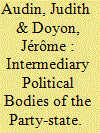

|
|
|
|
|
| Summary/Abstract |
Mass and grassroots organisations are not part of the official political structure of the Chinese Party-state, yet they have been operating as key actors serving the interests of the Party-state while interacting with ordinary citizens in various ways since the early years of the PRC. By studying these organisation’s intermediary status and role in the XXIst century, this special issue of China Perspectives reveals their importance in the political system – as mediators, social service providers, administrative staff – and analyses recent reforms of these organisations under the Xi government.
|
|
|
|
|
|
|
|
|
|
|
|
|
|
|
|
| 3 |
ID:
136293


|
|
|
|
|
| Summary/Abstract |
For a revolution over “culture,” remarkably little has been said about the Cultural Revolution culture itself, and even less about the apolitical, private art produced underground. This article explores this apolitical, private art, arguing that it was a “rebellion of the heart” against the state’s ruthless destruction of the private sphere. Mao’s Party-state drastically fragmented families, moulding socialist subjects through “revolution deep down into the soul.” Paintings of (broken) homes and interiors, flowers, and moonlight articulate lived experiences of the revolution while silently reinventing a private refuge for the body and soul to subsist beyond state control. Defying orthodox revolutionary mass culture, this apolitical art articulated private experience and created a private inner world for a new form of modern subjectivity, while generating community and human solidarity against relentless class struggle and alienation.
|
|
|
|
|
|
|
|
|
|
|
|
|
|
|
|
| 4 |
ID:
160930
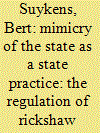

|
|
|
|
|
| Summary/Abstract |
Around half a million cycle rickshaws are currently active in Dhaka, Bangladesh. With only 86,000 official licenses available, different types of organizations supply licenses to most rickshaw drivers. These non-official licenses mimic the language of the state. This article argues that while these licenses appear as part of non-state, hybrid, or twilight institutions, they in fact constitute a state practice. Based on approximately 200 semi-structured interviews at six locations in Dhaka and offering a conceptualization of the Bangladesh state as a party-state, the article shows that the operation of non-official rickshaw licenses and the mimicry entailed is an inherent part of party-state governance, one which is not morally neutral. While most respondents saw the everyday benefits of non-official licenses in the absence of sufficient official ones, the latter remained the most prized and, if made available, respondents agreed that the former would become redundant.
|
|
|
|
|
|
|
|
|
|
|
|
|
|
|
|
| 5 |
ID:
143560
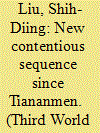

|
|
|
|
|
| Summary/Abstract |
In the aftermath of the crackdown in Tiananmen, China’s political landscape has witnessed a new protest cycle. Unrest has escalated as a consequence of the reconfiguration of the Party-state, which has to deal with an increasingly restive society. The protest politics since the 1990s has unfolded with a set of distinctively different patterns, dynamics and consequences alongside with the transformation of the Party-state. This paper gives an account of the emerging new contentious sequence, with an emphasis on how the transformation of the Party-state has facilitated the conditions for popular resistance. The distinctiveness of the new sequence rests in the ambivalent relationship and strategic engagement with the decentralised Party-state, which has increasingly accommodated mass protest to recapture regime legitimacy. Profound changes in state governance and state–society linkages, the central–local divide, as well as the socialist tradition have all combined to reshape the conditions for contemporary popular struggle in China.
|
|
|
|
|
|
|
|
|
|
|
|
|
|
|
|
| 6 |
ID:
181925
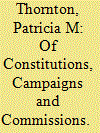

|
|
|
|
|
| Summary/Abstract |
Democratic centralism, a hallmark of Leninist party organizations, has played a formative role in the history of the Chinese Communist Party (CCP). Yet despite being hailed as an “inviolable” and “unchanging” Party principle, understandings of democratic centralism have shifted dramatically over the century of its existence. This study traces the long arc of the concept's evolution across successive Party Constitutions, focusing on three critical historical junctures: the Sixth Party Congress, which formally adopted democratic centralism into its Constitution as an organizational principle; the Seventh Party Congress, which adopted rectification as the Party's practice of democratic centralism; and the 19th Party Congress, which set a new milestone in codifying the system as a disciplinary tool. I argue that while democratic centralism exemplifies the CCP's institutional plasticity and adaptive governance and is critical to understanding Party-driven constitutionalism in contemporary China, it also highlights an irresolvable paradox inherent in Party rule. Adaptability does not necessarily impart resilience. I conclude that the CCP's normatively unconstrained extra-constitutional leadership under Xi Jinping highlights the essentially and increasingly irrationalist aspects of its illiberal governance project.
|
|
|
|
|
|
|
|
|
|
|
|
|
|
|
|
| 7 |
ID:
157768


|
|
|
|
|
| Summary/Abstract |
There has been significant debate about the land occupations which occurred from the year 2000 in Zimbabwe, with a key controversy concerning the role of the state and ruling party (or party-state) in the occupations. This controversy, deriving from two grand narratives about the occupations, remains unresolved. A burgeoning literature exists on the Zimbabwean state’s fast-track land reform programme, which arose in the context of the occupations, but this literature is concerned mainly with post-occupation developments on fast-track farms. This article seeks to contribute to resolving the controversy surrounding the party-state and the land occupations by examining the occupations in the Shamva District of Mashonaland Central Province. The fieldwork for our Shamva study focused exclusively on the land occupations (and not on the fast-track farms) and was undertaken in May 2015. We conclude from our Shamva study that involvement by the party-state did not take on an institutionalised form but was of a personalised character entailing interventions by specific party and state actors.
|
|
|
|
|
|
|
|
|
|
|
|
|
|
|
|
| 8 |
ID:
183136
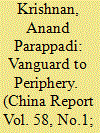

|
|
|
|
|
| Summary/Abstract |
With the ideological undergirding of Marxism–Leninism, the Communist Party of China (CPC) has claimed representation of peasants and workers in its vanguard role in actualising the socialist revolution. However, as China has developed economically over the past four decades, there has been an erosion in the status of workers and peasants as legitimate stakeholders in governance and ruling practices. This article attempts to map how labour, once a critical component of the CPC’s political–ideological invocation, has become peripheral as China transitioned to a market economy with an emphasis on economic rationale for growth and reforms. It examines the changing contours of the CPC’s discourse and practice over the past 100 years on the labour question, sandwiched as it is between the need for continued economic growth as a legitimating tool and the continued reiteration of being representative of the working class.
|
|
|
|
|
|
|
|
|
|
|
|
|
|
|
|
|
|
|
|
|